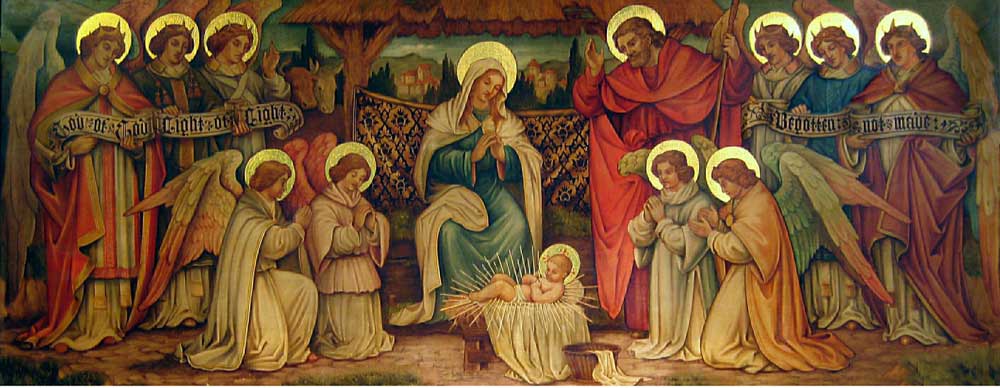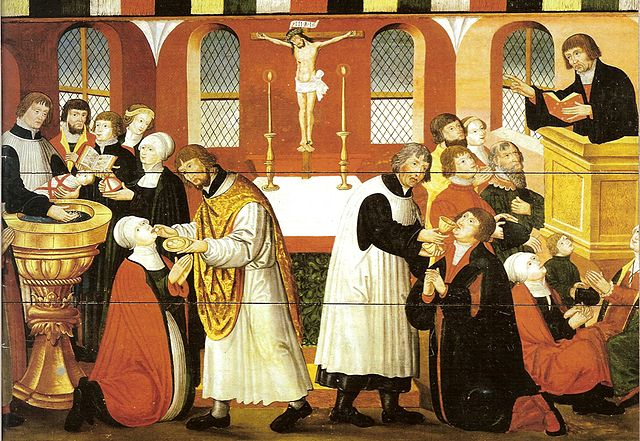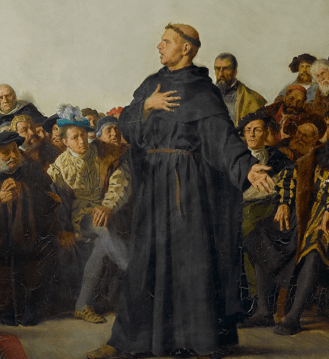The Emphasis Of Advent (Luke 3:1-14)
Second Sunday in Advent, December 5, 2021
Grace be unto you, and peace, from God our Father, and from the Lord Jesus Christ. Amen.
Text: St. Luke 3:1-14, but especially these words –
The word of God came to John son of Zechariah in the desert. He went into all the country around the Jordan, preaching a baptism of repentance for the forgiveness of sins.
In the name of the Father, and of the Son, and of the Holy Spirit. Amen.
Dear Friends in Christ Jesus:
The emphasis of the Advent season is repentance. Prepare the way for the Lord! And yet, the question that’s so very often put before us today is – “Who needs repentance?” For society’s idea of repentance is trying to make ourselves look good on the outside with the same old self on the inside. A shallow, cosmetic sort of thing.
But this isn’t what repentance is all about! However, it was the attitude that John the Baptist had to endure, as he confronted the people of his day. After all, they were Jews, the sons of Abraham, God’s chosen people! So, they felt that if there was any preparation necessary, any shaping up to do – it could be done with several small adjustments. But, you see, this attitude is still here today – the idea that a little brushing up will serve the purpose and is all that we really need. Because who needs repentance anyway? Can’t we meet God as we are?
Well, you and I need repentance – because we can’t meet God as we are. And it involves so much more than only a few small changes or minor adjustments. It involves all of life – and this is what so many are afraid of! For repentance goes beneath the surface and beyond the outward show of piety that they wrap themselves up in. It’s a painful process of a revolution that begins in our hearts – and that turns our lives around. Repentance reverses our priorities and our values. It shatters all of our own false hopes and ideas, our own security – and leads us to look outside ourselves to the One who alone is able to give us security, hope and peace.
Repentance tears us away from ourselves and invests our lives in and for others. It checks as wrong those easy answers we’ve always used. It rises in revolt against the sins we’ve committed and turns us back again toward God. Repentance comes with empty hands and empty hearts – and receives the grace of God’s forgiveness and love in Jesus Christ, which is, in fact, the only way that we can be prepared to meet the Lord when He comes. So, the emphasis of the Advent season is repentance. The voice is again calling in the desert. “Repent, for the kingdom of heaven is near.” Prepare the way for the Lord!
And so, as the voice calls out to you today, you ought to listen to what it has to say. But this seems to be one of our greatest shortcomings today. No one ever listens – or if they do, they don’t really hear what’s being said. The young person says – “My parents don’t understand me. They never listen to what I have to say.” And maybe he or she is right. However, maybe the young person also has a problem of not listening. Or a wife tells her husband – “The problem is that you never listen to me anymore.” And I would imagine that she might at times be right also. For, as I’ve been told, the human male ear is an amazing mechanism with a very effective filtering system. And yet, today the voice calls. And what you hear isn’t an echo that’s disappearing in the distance, but a voice that gets louder and louder – as you go on digging yourselves in deeper and deeper. And so, we ought to listen, to really hear the “voice of one calling in the desert, ‘Prepare the way for the Lord!’”
We are looking at two statements in the text for today. One goes back almost 3,000 years, written by the prophet Isaiah. The other goes back about 2,000 years, written by St. Luke. So, how do these statements apply to us? What in the world could an Old Testament prophet know about our problems today, or how could a first century evangelist possibly help us? However, these two statements do apply to us – if we’ll only listen to what God has to say.
In the Old Testament, the prophet Isaiah looked ahead in time and saw the people of Israel being held in slavery. Jerusalem, the Holy City, laying in ruin, and the temple of God destroyed. This would be God’s judgment on a faithless people who had sinned and had not repented, who had tried to use God rather than serve Him, who had tried to manipulate Him to serve their purpose while forgetting the mission and purpose He had given them. And yet, in spite of all this, God said to the prophet Isaiah – “Comfort, comfort my people…Speak tenderly to Jerusalem, and proclaim to her that her hard service has been completed, that her sin has been paid for, that she has received from the Lord’s hand double for all her sins.” A voice calls out in the desert, prepare the way for the Lord. Get ready for your God, for He will come and will act. For the covenant He had made with His people was not forgotten. The mission He had given them was not to be forsaken. God’s faithfulness and love toward them had never failed and had never diminished.
And is there any other way that God’s way can be prepared than by His message of forgiveness – God’s message that He hasn’t put us aside and forgotten us. For our hard service has been completed, our rebellion written off, our sins paid for. And about eight centuries went by before St. Luke repeated the words of the prophet Isaiah in reference to John the Baptist. He referred to him as “a voice of one calling the desert, ‘Prepare the way for the Lord.’” But notice how St. Luke does it. Sometimes you and I are tempted to ignore details. St. Luke didn’t.
He writes – “In the fifteenth year of the reign of Tiberius Caesar – when Pontius Pilate was governor of Judea…during the high priesthood of Annas and Caiaphas, the word of God came to John son of Zechariah in the desert. He went into all the country around the Jordan, preaching a baptism of repentance for the forgiveness of sins.” St. Luke carefully details the names of those in authority – and with a purpose. For in this setting, our redemption would be accomplished. This was history, the situation at that time – with its emperors and governors, its politics and policies. Now, the mighty God was coming into the world to act. And in the desert – a voice. Prepare the way – because God is coming.
And is there any other way that God’s way can be prepared than by the message of repentance for the forgiveness of sins? Is there any other way His paths can be made straight, the valleys filled in, and the mountains and hills be made level – than by God’s message that He hasn’t put the world aside, but that He has instead come to break oppression, to set the captives free, to take away transgressions, and to rule? We really miss the point unless we understand what St. Luke is telling us in these details of history – that Jesus Christ came into the world, into our history – that His salvation is a very real thing and that it’s for us! So, we can’t put the Lord aside or put Him in some corner, you can’t put your faith in a place where it has nothing significant to say, and you can’t ignore His Word as though it doesn’t concern itself with your problems.
For through the prophet Isaiah, through St. Luke, and through John the Baptist, God speaks to you and to me, even today. “Repent, and prepare my way.” And this is a Word you can use. This Word is just as important as it ever was. For God is here with us now. Forgiveness and freedom have been secured. Repent! Believe! And obey! To repent is nothing less than to turn from whatever it is that keeps us from having anything to do with God. To repent is nothing less than removing the barriers and roadblocks, those things that get between us and God. To repent is nothing less than feeling sorrow over the mess we’ve made of things, when we’ve gone our own way. To repent is nothing less than turning back to God, whose hand still reaches out to us where we are. And so, to repent involves a total change in our lives.
John the Baptist put it this way – “Prepare the way for the Lord, make straight paths for him.” And that’s what he was here for – to prepare the Lord’s way, to proclaim repentance for the forgiveness of sins in Jesus Christ. The message of John the Baptist in the text for today – is an obvious description of a highway project, where the cuts through the mountains and hills provide the fill for the valleys and low places – so that the road might be smooth and straight. This is also what repentance and forgiveness are all about. To level the mountains and hills of human pride, to fill the valleys of despair and hopelessness, to get rid of all the crooked and perverse things in our lives, and to smooth out the rough places – to make a highway for our God so that He might be able to come to us with His forgiveness, grace, power and love.
Therefore, today, God calls upon us to take a look at ourselves, to examine our priorities, and the intensity of our devotion, service and love. He asks us to take a look at all those things that disturb us, bother us, and all too often defeat us – and to bring them to Him because of Jesus Christ’s forgiving and strengthening love. God calls upon us to come to Him, to open our empty hearts, hands and lives – there to receive His abundant grace and blessing. Amen.
The peace of God, which passes all understanding, keep your hearts and minds through Christ Jesus. Amen.








